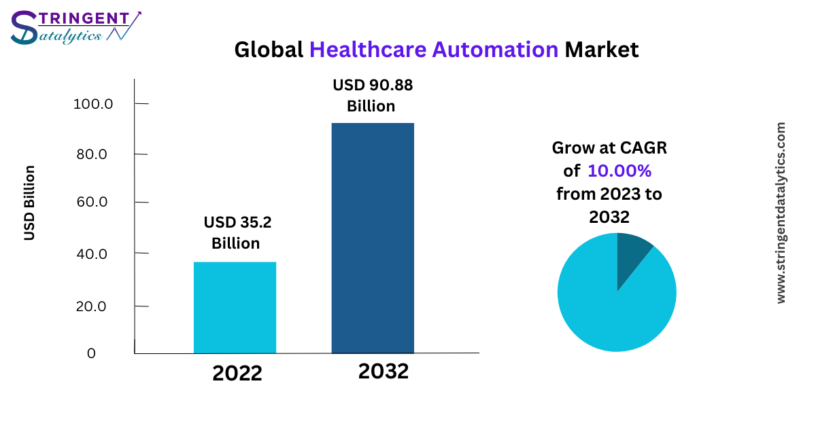Healthcare Automation Market was estimated at USD 35.2 Billion in 2022 and is expected to reach USD 90.88 Billion by 2032, registering a CAGR of 10.00% during the forecast period 2023 to 2032.
The healthcare automation market is rapidly expanding as healthcare providers increasingly adopt advanced technologies to streamline operations, enhance patient care, and reduce costs. Automation in healthcare encompasses a wide range of applications, from administrative tasks and diagnostic procedures to treatment and patient monitoring. The integration of robotics, artificial intelligence (AI), machine learning, and advanced software solutions is transforming the healthcare industry, making processes more efficient and improving patient outcomes.
Key components and segments of the healthcare automation market include:
- Robotic Process Automation (RPA):
- Administrative Automation: RPA is used to automate repetitive administrative tasks such as patient registration, billing, scheduling, and claims processing. This reduces the administrative burden on healthcare staff, minimizes errors, and improves efficiency.
- Supply Chain Management: Automation in inventory management, procurement, and logistics ensures that healthcare facilities maintain adequate supplies and reduce waste.
- Clinical Automation:
- Robotic Surgery: Robotic-assisted surgery systems, such as the Da Vinci Surgical System, enable precise and minimally invasive surgical procedures, improving patient recovery times and outcomes.
- Automated Diagnostics: Automated diagnostic machines and AI-powered imaging systems assist in the accurate and rapid diagnosis of diseases, reducing the time needed for manual analysis and increasing diagnostic accuracy.
- Laboratory Automation: Automated laboratory systems handle sample processing, testing, and analysis, increasing throughput and accuracy while reducing human error.
- Patient Management Automation:
- Electronic Health Records (EHR): Automated EHR systems streamline the documentation and management of patient records, facilitating better data sharing, improving care coordination, and enhancing patient safety.
- Patient Monitoring: Remote patient monitoring systems and wearable devices collect real-time health data, enabling continuous monitoring and timely interventions for chronic disease management and post-operative care.
- Telehealth: Automated scheduling, virtual consultations, and remote patient management platforms enhance access to healthcare services, especially in remote and underserved areas.
- Pharmacy Automation:
- Automated Dispensing: Automated pharmacy systems manage medication dispensing, reduce medication errors, and ensure accurate inventory management.
- Robotic Pharmacists: Robotics in pharmacies assist in the preparation, dispensing, and distribution of medications, improving efficiency and safety.
- AI and Machine Learning:
- Predictive Analytics: AI and machine learning algorithms analyze large datasets to predict disease outbreaks, patient readmissions, and treatment outcomes, helping healthcare providers make informed decisions.
- Personalized Medicine: AI-driven analysis of genetic, clinical, and lifestyle data enables the development of personalized treatment plans tailored to individual patient needs.
- Healthcare Facility Management:
- Building Automation Systems (BAS): Automation in HVAC, lighting, and security systems ensures optimal operation, energy efficiency, and safety in healthcare facilities.
- Infection Control: Automated disinfection systems, such as UV robots, help maintain sterile environments and reduce the risk of healthcare-associated infections.
The healthcare automation market has experienced significant growth due to several factors:
- Technological Advancements: Continuous innovations in robotics, AI, IoT, and data analytics drive the development of sophisticated automation solutions that enhance healthcare delivery and operational efficiency.
- Increasing Healthcare Costs: Automation helps reduce operational costs, optimize resource utilization, and improve productivity, addressing the growing financial pressures on healthcare systems.
- Aging Population: The rising elderly population increases the demand for healthcare services, necessitating the adoption of automation to manage the higher patient volumes and complexity of care.
- Chronic Disease Management: Automation supports the management of chronic diseases by enabling continuous monitoring, early detection of complications, and personalized treatment plans.
- Regulatory and Quality Requirements: Compliance with stringent regulatory standards and quality requirements drives the adoption of automation to ensure accuracy, traceability, and adherence to best practices.
Get Free Exclusive PDF Sample Copy of This Research Report https://stringentdatalytics.com/sample-request/healthcare-automation-market/16478/
Market Segmentations:
Global Healthcare Automation Market: By Company
Siemens
GE
Swisslog
Koninklijke Philips
Medtronic
Intuitive Surgical
Stryker
Danaher
Tecan
Global Healthcare Automation Market: By Type
Therapeutic Automation
Lab and Pharmacy Automation
Logistics and Training Automation
Diagnostics and Monitoring Automation
Global Healthcare Automation Market: By Application
Hospitals & Diagnostic Centers
Research Laboratories & Institutes
Pharmacies
Home/Ambulatory Care Settings & Others
Global Healthcare Automation Market: Regional Analysis
The regional analysis of the global Healthcare Automation market provides insights into the market’s performance across different regions of the world. The analysis is based on recent and future trends and includes market forecast for the prediction period. The countries covered in the regional analysis of the Healthcare Automation market report are as follows
North America: The North America region includes the U.S., Canada, and Mexico. The U.S. is the largest market for Cold-chain Pharma in this region, followed by Canada and Mexico. The market growth in this region is primarily driven by the presence of key market players and the increasing demand for the product.
Europe: The Europe region includes Germany, France, U.K., Russia, Italy, Spain, Turkey, Netherlands, Switzerland, Belgium, and Rest of Europe. Germany is the largest market for Cold-chain Pharma in this region, followed by the U.K. and France. The market growth in this region is driven by the increasing demand for the product in the automotive and aerospace sectors.
Asia-Pacific: The Asia-Pacific region includes Singapore, Malaysia, Australia, Thailand, Indonesia, Philippines, China, Japan, India, South Korea, and Rest of Asia-Pacific. China is the largest market for Cold-chain Pharma in this region, followed by Japan and India. The market growth in this region is driven by the increasing adoption of the product in various end-use industries, such as automotive, aerospace, and construction.
Middle East and Africa: The Middle East and Africa region includes Saudi Arabia, U.A.E, South Africa, Egypt, Israel, and Rest of Middle East and Africa. The market growth in this region is driven by the increasing demand for the product in the aerospace and defense sectors.
South America: The South America region includes Argentina, Brazil, and Rest of South America. Brazil is the largest market for Cold-chain Pharma in this region, followed by Argentina. The market growth in this region is primarily driven by the increasing demand for the product in the automotive sector.
Key Indicators Analysed
Market Players & Competitor Analysis: The report covers the key players of the industry including Company Profile, Product Specifications, Production Capacity/Sales, Revenue, Price and Gross Margin 2016-2027 & Sales with a thorough analysis of the market’s competitive landscape and detailed information on vendors and comprehensive details of factors that will challenge the growth of major market vendors.
Global and Regional Market Analysis: The report includes Global & Regional market status and outlook 2016-2027. Further the report provides break down details about each region & countries covered in the report. Identifying its sales, sales volume & revenue forecast. With detailed analysis by types and applications.
Market Trends: Market key trends which include Increased Competition and Continuous Innovations.
Opportunities and Drivers: Identifying the Growing Demands and New Technology
Porters Five Force Analysis: The report provides with the state of competition in industry depending on five basic forces: threat of new entrants, bargaining power of suppliers, bargaining power of buyers, threat of substitute products or services, and existing industry rivalry
Click Here, To Buy Premium Report https://stringentdatalytics.com/purchase/healthcare-automation-market/16478/?license=single
Reasons to Purchase this Report
- Market segmentation based on qualitative and quantitative analysis, taking into account both economic and non-economic aspects.
- Data on market value (in US dollars) for each section and sub-segment
- Identifies the area and market segment anticipated to experience the quickest growth and hold the majority of the market.
- Analysis by geography showcasing product/service usage in the region and highlighting the market dynamics affecting each region.
- A competitive landscape that takes into account recent service/product launches, collaborations, company expansions, and acquisitions by the companies profiled, as well as the market share of the leading players.
- Comprehensive company profiles for the top players in the industry, including business overviews, corporate insights, product benchmarking, and SWOT analyses
- The industry’s future market forecast in light of recent changes, including growth possibilities, drivers of growth, and obstacles present in both developing and emerging economies.
- Comprises a thorough examination of the market from a number of angles using Porter’s Five Forces analysis.
- Offers market knowledge across the Value Chain
- The current market dynamics scenario and future market expansion prospects
About Stringent Datalytics
Stringent Datalytics offers both custom and syndicated market research reports. Custom market research reports are tailored to a specific client’s needs and requirements. These reports provide unique insights into a particular industry or market segment and can help businesses make informed decisions about their strategies and operations.
Syndicated market research reports, on the other hand, are pre-existing reports that are available for purchase by multiple clients. These reports are often produced on a regular basis, such as annually or quarterly, and cover a broad range of industries and market segments. Syndicated reports provide clients with insights into industry trends, market sizes, and competitive landscapes. By offering both custom and syndicated reports, Stringent Datalytics can provide clients with a range of market research solutions that can be customized to their specific needs.
Contact Us
Stringent Datalytics
Contact No- +1 346 666 6655
Email Id- sales@stringentdatalytics.com
Web- https://stringentdatalytics.com/




Leave a Reply